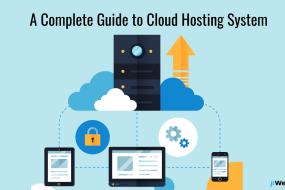
In today’s fast-paced digital landscape, businesses are increasingly turning to cloud hosting solutions to meet their ever-growing resource demands. Cloud hosting offers unparalleled scalability, flexibility, and cost-efficiency compared to traditional hosting methods. However, effectively scaling your resources in a cloud environment requires a strategic approach and a keen understanding of cloud security. In this comprehensive guide, we will explore the ins and outs of scaling resources in a cloud hosting environment and delve into the realm of cloud security to ensure a smooth and secure transition. Let’s dive in!
Why Opt for Private Cloud Hosting?
Private cloud hosting has emerged as a preferred choice for businesses seeking enhanced control, security, and performance. By utilizing dedicated hardware and isolated networks, private cloud hosting offers a higher level of privacy and security compared to public cloud solutions. With private cloud hosting, you have the ability to tailor your infrastructure to meet specific requirements, ensuring optimal performance and scalability. Now, let’s explore the best practices for scaling your resources in a private cloud hosting environment.
Scaling Resources in a Private Cloud Environment
Evaluating Your Resource Requirements
The first step towards effective resource scaling is evaluating your current and projected resource requirements. Consider factors such as website traffic, application usage, and data storage needs. By analyzing these metrics, you can identify potential bottlenecks and plan for future growth. It is crucial to strike a balance between allocating enough resources to meet current demand while leaving room for future scalability.
Leveraging Auto Scaling Capabilities
One of the most significant advantages of private cloud hosting is the ability to leverage auto scaling capabilities. Auto scaling allows your infrastructure to dynamically adjust resource allocation based on real-time demand. By setting predefined thresholds and rules, your environment can automatically scale up or down, ensuring optimal performance and cost-efficiency. This automated approach saves time and resources, as manual intervention is no longer required for scaling purposes.
Optimizing Resource Allocation
To ensure efficient resource allocation, it is essential to monitor and optimize your infrastructure regularly. Identify any underutilized resources and reallocate them to areas with higher demand. Employ resource optimization techniques such as load balancing, which evenly distributes traffic across multiple servers, minimizing the risk of performance degradation during peak times. By continuously fine-tuning your resource allocation, you can maximize efficiency and cost-effectiveness.
Implementing Cloud Security Measures
While scaling resources in a private cloud environment, it is imperative to prioritize cloud security to safeguard your infrastructure and data. Here are some essential cloud security measures to consider:
- Data Encryption: Utilize robust encryption algorithms to protect sensitive data both in transit and at rest. Encryption adds an extra layer of security, making it harder for unauthorized individuals to access your information.
- Access Control: Implement strict access controls to ensure only authorized personnel can access your infrastructure and data. Utilize strong authentication mechanisms such as multi-factor authentication (MFA) to mitigate the risk of unauthorized access.
- Regular Auditing and Monitoring: Employ comprehensive auditing and monitoring tools to track and analyze system activities. This enables the detection of any suspicious behavior or security breaches, allowing for timely intervention and mitigation.
- Disaster Recovery Planning: Develop a robust disaster recovery plan to ensure business continuity in the event of unforeseen incidents. Regularly back up your data and test your recovery procedures to minimize downtime and data loss.
Frequently Asked Questions (FAQs)
1. What is cloud security, and why is it important?
Cloud security refers to the set of measures and practices employed to protect data, applications, and infrastructure in a cloud environment. It is vital because it ensures the confidentiality, integrity, and availability of your resources, mitigating the risk of unauthorized access, data breaches, and service disruptions.
2. How does private cloud hosting enhance security compared to public cloud solutions?
Private cloud hosting offers enhanced security compared to public cloud solutions by providing dedicated hardware, isolated networks, and greater control over access permissions. This heightened level of privacy and control enables businesses to implement stringent security measures tailored to their specific needs.
3. What are the benefits of auto scaling in a private cloud environment?
Auto scaling in a private cloud environment offers several benefits, including improved resource utilization, optimized performance, and cost-efficiency. By automatically adjusting resource allocation based on demand, auto scaling ensures that you have the right amount of resources available at all times, eliminating wastage and minimizing downtime.
4. How often should I review and optimize resource allocation in my private cloud environment?
Regular review and optimization of resource allocation are crucial to maintain optimal performance and cost-effectiveness. It is recommended to conduct these reviews periodically, at least once every quarter, to identify any underutilized resources and make necessary adjustments.
5. What are the key considerations for disaster recovery planning in a private cloud hosting environment?
When planning for disaster recovery in a private cloud hosting environment, consider factors such as regular data backups, redundancy across multiple data centers, automated failover mechanisms, and testing of recovery procedures. These measures will help minimize downtime and ensure business continuity in the face of unforeseen events.
Conclusion
Scaling your resources in a private cloud hosting environment is a critical aspect of ensuring optimal performance and cost-effectiveness for your business. By evaluating your resource requirements, leveraging auto scaling capabilities, optimizing resource allocation, and implementing robust cloud security measures, you can achieve seamless scalability while maintaining a secure infrastructure. Remember to regularly review and fine-tune your resource allocation to adapt to changing demands. With these best practices in place, you can harness the full potential of cloud hosting and propel your business towards growth and success.
Advertisement






